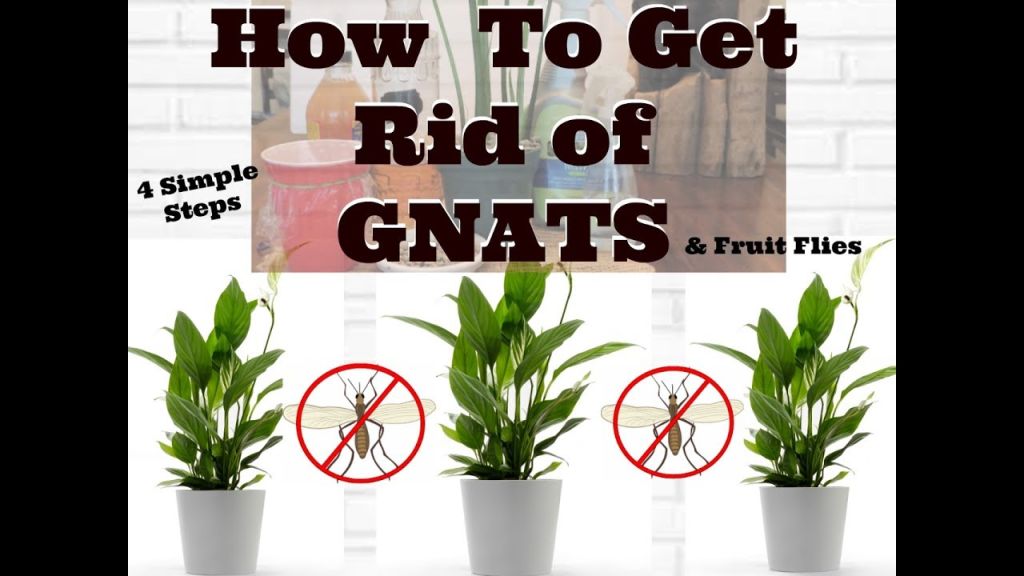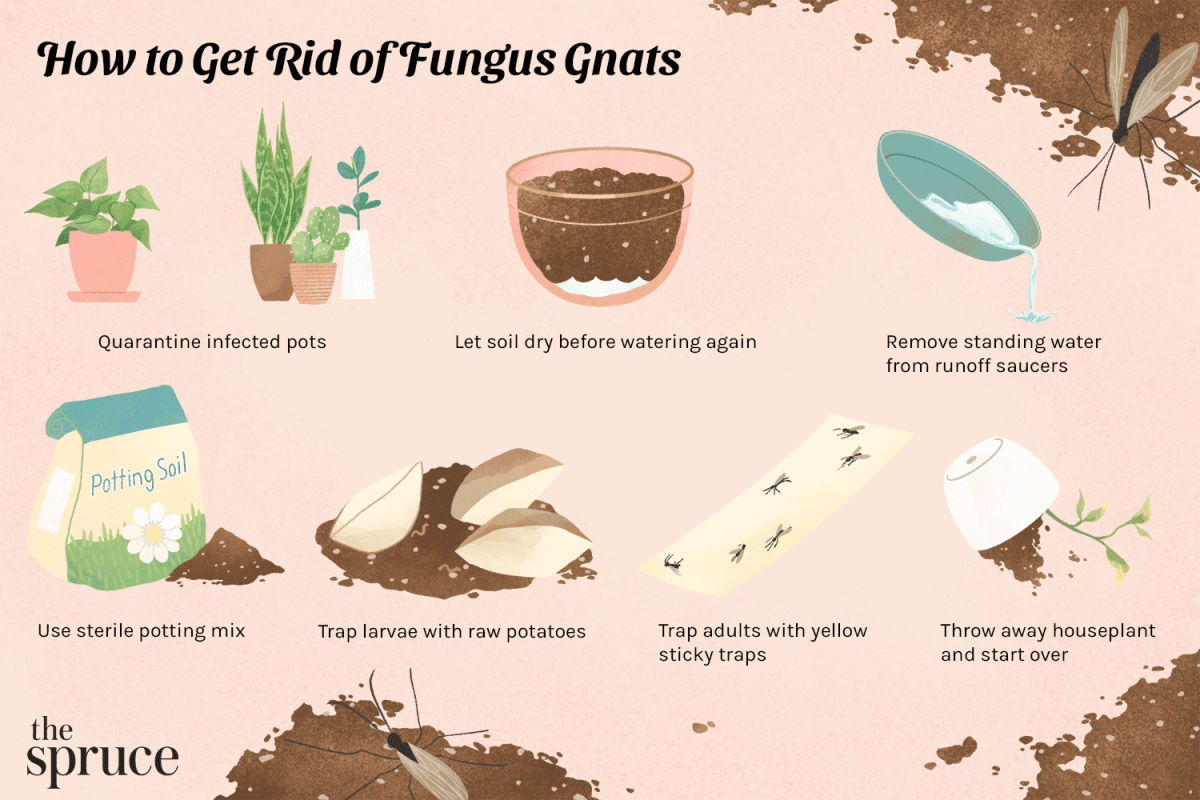Bye-Bye Pesky Fruit Flies: Easy Tips To Rid Your House Plants Of Those Annoying Bugs

How to Get Rid of Fruit Flies in House Plants
Introduction
Fruit flies are pesky little insects that can quickly infest your house plants, making it difficult to enjoy your indoor garden. These tiny creatures are attracted to decaying organic matter, such as rotten fruits or vegetables, which makes house plants an ideal breeding ground for them. If left untreated, fruit flies can multiply rapidly and become a major nuisance. In this article, we will explore what fruit flies are, how they infest house plants, and provide effective solutions to get rid of them.
What Are Fruit Flies?

Fruit flies, also known as vinegar flies or pomace flies, are small insects that belong to the family Drosophilidae. They are commonly found around overripe fruits, vegetables, and fermenting substances. These flies are attracted to the smell of fermentation and are often found near beer, wine, or vinegar. Fruit flies are about 1/8 inch in length and have a tan or light brown body with red eyes.
How Do Fruit Flies Infest House Plants?
Fruit flies can easily find their way into your house plants through open doors or windows. Once inside, they are attracted to any decaying organic matter present in the soil, such as fallen leaves, dead roots, or overripe fruits that may have dropped onto the pot. The damp environment of the soil provides optimal conditions for fruit fly larvae to hatch and develop into adults.
What is Known About Fruit Fly Infestations in House Plants?
Fruit fly infestations in house plants are quite common, especially during warmer months. These tiny insects can quickly multiply, with each female fruit fly capable of laying up to 500 eggs. The eggs hatch into larvae, which feed on the decaying organic matter in the soil. Within a week, the larvae pupate and emerge as adult fruit flies, ready to continue the cycle. Fruit flies can complete their life cycle in as little as 8-10 days, leading to a rapid increase in population if not dealt with promptly.
Solution: How to Get Rid of Fruit Flies in House Plants
Getting rid of fruit flies in house plants requires a systematic approach to eliminate both the adults and the larvae. Here are some effective solutions:
1. Remove Attractants
Start by removing any decaying organic matter from the house plant’s vicinity. This includes fallen leaves, overripe fruits, or vegetables. Dispose of them in sealed plastic bags to prevent fruit flies from accessing them. Additionally, avoid overwatering your plants, as damp soil provides an ideal breeding ground for fruit fly larvae.
2. Trap the Adults
Set up fruit fly traps near your house plants to catch the adult flies. You can easily make a homemade trap using a small container filled with apple cider vinegar or a solution of water and dish soap. Cover the container with plastic wrap and poke a few small holes in it. The fruit flies will be attracted to the smell and will enter the container through the holes but won’t be able to escape.
3. Clean and Treat the Soil
Carefully remove the top layer of soil from the infested plants and replace it with fresh, sterile soil. This will help eliminate any larvae or pupae present in the soil. You can also treat the soil with a natural insecticide or beneficial nematodes, which are microscopic worms that feed on fruit fly larvae.
4. Maintain Good Plant Hygiene
Regularly inspect and clean your house plants to prevent fruit fly infestations. Trim off any dead or decaying leaves and remove fallen fruits promptly. Ensure proper drainage in your pots and avoid overwatering. Good plant hygiene will create an inhospitable environment for fruit flies and help keep them at bay.
5. Use Fruit Fly Traps and Insecticides
If the infestation persists, consider using fruit fly traps or insecticides specifically designed for indoor plants. These products are readily available at garden centers and nurseries. Follow the instructions carefully and keep in mind that repeated treatments may be necessary to completely eliminate the infestation.
Conclusion
Fruit flies in house plants can be a frustrating problem, but with the right approach, they can be effectively eradicated. By removing attractants, trapping the adults, cleaning and treating the soil, maintaining good plant hygiene, and using appropriate traps or insecticides, you can regain control over your indoor garden and enjoy your house plants without the annoyance of fruit flies. Remember to be patient and persistent, as it may take some time to completely eliminate the infestation.
Frequently Asked Questions (FAQs)
1. Can fruit flies cause harm to house plants?
Fruit flies themselves do not cause direct harm to house plants. However, their presence indicates the presence of decaying organic matter in the soil, which can attract other pests and lead to plant diseases. It is important to address fruit fly infestations promptly to maintain the health of your house plants.
2. Can fruit flies infest all types of house plants?
Yes, fruit flies can infest a wide range of house plants. They are attracted to any decaying organic matter present in the soil, regardless of the type of plant. However, some plants may be more susceptible to infestations due to their watering requirements or the type of organic matter present in the soil.
3. Are fruit flies harmful to humans?
Fruit flies are generally not harmful to humans. They do not bite or sting and are more of a nuisance than a health threat. However, it is best to avoid consuming any fruits or vegetables that have been infested with fruit fly larvae.
4. How can I prevent fruit fly infestations in the future?
To prevent future fruit fly infestations, avoid overripe fruits or vegetables near your house plants. Regularly clean up fallen leaves or fruits and maintain good plant hygiene. If you notice any signs of infestation, such as small flying insects, promptly take the necessary steps to eliminate them.
5. Can I use chemical pesticides to get rid of fruit flies?
While chemical pesticides may be effective in eliminating fruit flies, they are not recommended for indoor use due to the potential risks to human health and the environment. It is best to use natural remedies, traps, or insecticides specifically designed for indoor plants to control fruit fly infestations.

I am a beginner writer who continues to learn and consistently creates informative articles to express the ideas that I master.